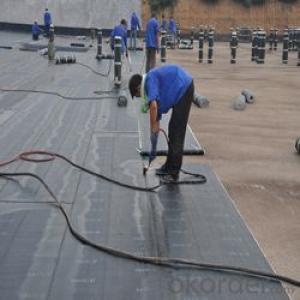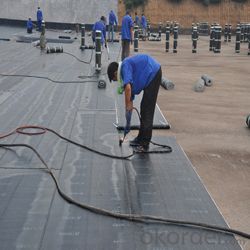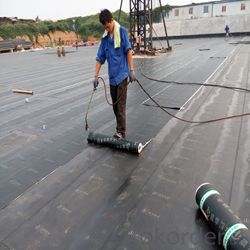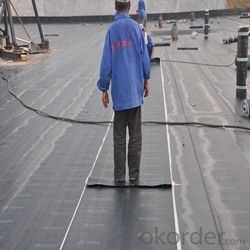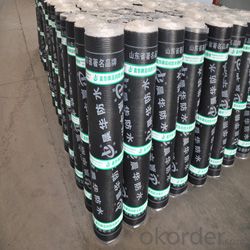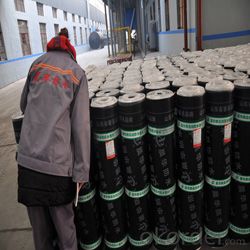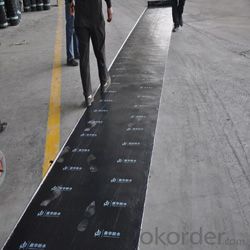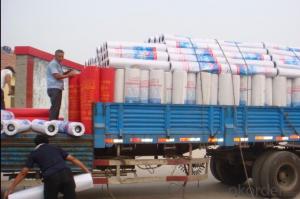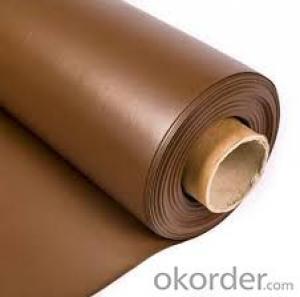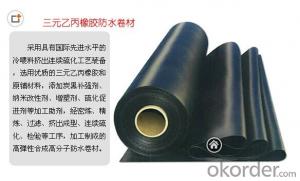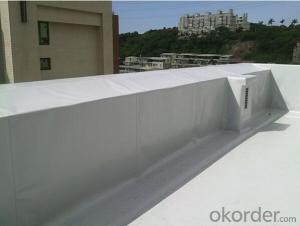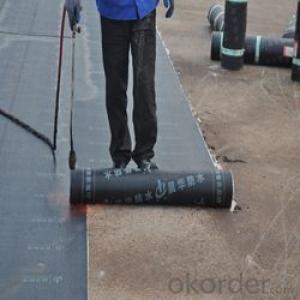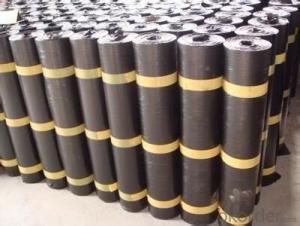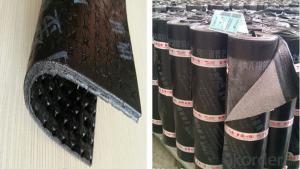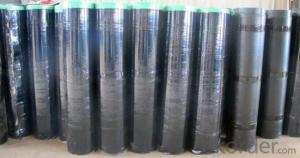SBS bitumen waterproof membrane
- Loading Port:
- Qingdao
- Payment Terms:
- TT OR LC
- Min Order Qty:
- -
- Supply Capability:
- 122000 m²/month
OKorder Service Pledge
OKorder Financial Service
You Might Also Like
Specification:
Width:1m
Length/roll:7.5m/10m/15m or as your need.
Surface:PE film/Granules/Sand etc.
Thickness:3mm\4mm.
Characteristic:
a) SBS modified bitumen waterproof membrane is specially used as waterproof material in cold area
b) APP is specially suitable for areas of high temperature and of strong sun-shine
SBS/APP Modified Bitumen Waterproof Membrane
c)Good performance in good impermeability ,anti-puncture, anti-broker, anti-resistance, anti-erosion, anti-mildew, anti-weathering
d)Possess good tensile strength, elongation rate and size stability which could be well suited the substrate
distortion and crack
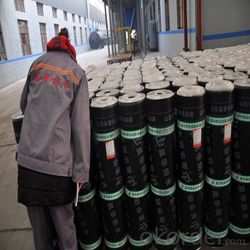
- Q: Can a waterproofing membrane be used on roofs with slope?
- Roofs with slope can use a waterproofing membrane. It is commonly applied on sloped roofs to add an extra layer of protection against water infiltration. The membrane is typically placed beneath the roofing materials and acts as a barrier to stop water from seeping into the roof structure. This is particularly crucial for sloped roofs as water runoff is faster and may lead to leaks or damage. The waterproofing membrane is designed to be flexible and is able to adapt to the roof's slope without compromising its effectiveness. Moreover, it also enhances the roof's durability and lifespan by preventing moisture-related problems like rot or mold growth.
- Q: Can a waterproofing membrane be used on chrome surfaces?
- While a waterproofing membrane can potentially be applied to chrome surfaces, it may not be essential or advisable. Chrome surfaces usually possess natural resistance to water and moisture thanks to their inherent properties and protective coatings. These coatings effectively shield against corrosion and prevent water-related harm. Consequently, adding an extra layer of waterproofing membrane onto a chrome surface might not yield any additional advantages and could potentially compromise the chrome's appearance and functionality. To ensure the appropriate treatment for chrome surfaces, it is always wise to consult the manufacturer or seek guidance from a professional in the field.
- Q: Are waterproofing membranes suitable for exterior use?
- Yes, waterproofing membranes are suitable for exterior use. These membranes are specifically designed to provide a barrier against water penetration and are commonly used in various exterior applications such as rooftops, balconies, and foundations. They are made from durable materials that can withstand exposure to harsh weather conditions, UV rays, and temperature fluctuations. Waterproofing membranes help to prevent water damage, moisture buildup, and potential structural issues caused by water infiltration. Additionally, they can be applied to different types of surfaces including concrete, metal, and wood, making them versatile for various outdoor environments. Overall, waterproofing membranes are a reliable solution for protecting exterior surfaces from water damage and prolonging their lifespan.
- Q: Are waterproofing membranes suitable for commercial applications?
- Yes, waterproofing membranes are suitable for commercial applications. They are designed to provide a protective barrier against water infiltration, making them ideal for use in commercial buildings such as offices, retail spaces, and warehouses. Waterproofing membranes are durable, long-lasting, and can be applied to various types of surfaces, ensuring the integrity and longevity of commercial structures.
- Q: What are the different types of waterproofing membranes?
- Construction and building projects commonly utilize various types of waterproofing membranes to prevent water penetration through walls, roofs, or other structures. These membranes can be applied to different surfaces. 1. Bituminous Membranes: Comprised of bitumen, polymers, and reinforcement materials like fiberglass or polyester, bituminous waterproofing membranes are frequently employed in roofing applications. They can be applied using hot or cold processes and offer outstanding waterproofing properties and durability. 2. PVC Membranes: Synthetic PVC membranes exhibit high resistance to water, chemicals, and UV radiation. They are often used in roofing applications, particularly for flat or low-slope roofs. PVC membranes are lightweight, flexible, and easy to install, boasting long-lasting waterproofing protection while being puncture and tear-resistant. 3. EPDM Membranes: Synthetic rubber EPDM membranes find common use in roofing applications. These membranes are highly durable, flexible, and resistant to UV radiation, ozone, and extreme temperatures. They can be installed as a single-ply membrane or in combination with other materials. 4. TPO Membranes: TPO membranes, a type of single-ply roofing membrane, are commonly employed in commercial and industrial settings. Composed of polymer blends and reinforcement materials, TPO membranes exhibit high resistance to water, chemicals, and UV radiation. They are lightweight, flexible, and easy to install. 5. Liquid Applied Membranes: Liquid applied membranes are an application type where the waterproofing system is initially liquid and cures to form a seamless and flexible membrane. These membranes can be made from various materials such as acrylic, polyurethane, or rubber-based compounds. They are often used for below-grade applications like basements or foundations, as well as roofs or other surfaces. To ensure effective and long-lasting waterproofing protection, it is crucial to consider the specific project requirements and consult with professionals to determine the most suitable type of waterproofing membrane.
- Q: Can a waterproofing membrane be used for a tunnel?
- Yes, a waterproofing membrane can be used for a tunnel. A waterproofing membrane is a material or system that is designed to prevent the penetration of water into a structure. In the case of a tunnel, where there is a high risk of water ingress due to the surrounding soil or groundwater, a waterproofing membrane can be applied to the walls, floor, and ceiling of the tunnel to provide a protective barrier against water infiltration. The waterproofing membrane is typically made of a durable and flexible material, such as bitumen, PVC, or polyurethane. It is applied to the tunnel surfaces in multiple layers, ensuring a continuous and seamless seal. This membrane acts as a barrier that prevents water from seeping into the tunnel, protecting the structural integrity of the tunnel and enhancing its lifespan. In addition to providing waterproofing, a membrane can also offer other benefits to a tunnel. It can provide protection against chemicals, such as chloride or sulphate ions, which can cause corrosion in concrete structures. It can also act as a vapor barrier, preventing the migration of moisture from the surrounding soil into the tunnel. It is important to note that the selection and installation of a waterproofing membrane for a tunnel should be done by experienced professionals who understand the specific requirements and challenges of tunnel construction. The design and application of the membrane must take into account factors such as the geological conditions, water pressure, and expected traffic load on the tunnel. Overall, a waterproofing membrane can be effectively used for a tunnel to provide protection against water ingress and ensure the long-term durability of the structure.
- Q: Does a waterproofing membrane require any special considerations for installation in high-humidity areas?
- Yes, a waterproofing membrane does require special considerations for installation in high-humidity areas. High humidity can increase the moisture levels that the membrane is exposed to, potentially affecting its performance and durability. It is important to choose a membrane specifically designed for high-humidity environments and follow proper installation techniques to ensure effective moisture protection. Additionally, regular inspections and maintenance should be conducted to prevent any potential damage or deterioration caused by the high humidity.
- Q: Are waterproofing membranes resistant to salt damage?
- Waterproofing membranes are generally resistant to salt damage, as they are specifically designed to create a barrier against moisture and water infiltration, offering protection against saltwater as well. Saltwater can be highly corrosive and cause harm to different materials, but waterproofing membranes are typically constructed using materials that can withstand the corrosive effects of salt. These membranes often consist of reinforced PVC, modified bitumen, or EPDM rubber, all of which have proven their durability and reliability in saltwater environments. In fact, waterproofing membranes are commonly used in areas like basements, swimming pools, and marine structures, where they are regularly exposed to saltwater. Thus, it can be concluded that waterproofing membranes are generally resistant to salt damage and effectively shield against saltwater infiltration.
- Q: Can a waterproofing membrane be used on tunnels with electrical installations?
- Tunnels with electrical installations can benefit from the use of a waterproofing membrane. The main purpose of this membrane is to stop water from entering and causing moisture damage to the underlying structures. In order to ensure the smooth and safe functioning of the installations, it is crucial to safeguard the electrical equipment and wiring from water damage. Applying a waterproofing membrane to the walls and ceilings of the tunnel is an effective way to prevent any potential water ingress, thereby reducing the risk of harm to the electrical installations. However, it is important to seek advice from professionals who specialize in tunnel waterproofing to ensure that the chosen membrane is suitable for the specific needs of the tunnel and electrical installations. Factors such as fire resistance, electrical insulation, and durability should be taken into consideration when making this decision.
- Q: Is a waterproofing membrane resistant to punctures or tears?
- A waterproofing membrane is created to resist punctures or tears, being made from robust materials like PVC, TPO, or EPDM, renowned for their strength and damage resistance. These membranes undergo extensive testing to ensure they can endure different environmental conditions and potential causes of punctures or tears, like sharp objects or heavy foot traffic. Some waterproofing membranes even have reinforcement layers or added protection to further strengthen their resistance to punctures and tears. Nevertheless, it is crucial to note that while waterproofing membranes are highly durable, they are not entirely immune to damage. Proper installation, regular maintenance, and avoiding unnecessary stress or impact on the membrane can help extend its lifespan and enhance its performance.
Send your message to us
SBS bitumen waterproof membrane
- Loading Port:
- Qingdao
- Payment Terms:
- TT OR LC
- Min Order Qty:
- -
- Supply Capability:
- 122000 m²/month
OKorder Service Pledge
OKorder Financial Service
Similar products
Hot products
Hot Searches
Related keywords
